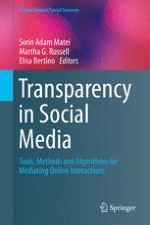2015 | OriginalPaper | Chapter
Embedding Privacy and Ethical Values in Big Data Technology
Authors : Michael Steinmann, Julia Shuster, Jeff Collmann, Sorin Adam Matei, Rochelle E. Tractenberg, Kevin FitzGerald, Gregory J. Morgan, Douglas Richardson
Published in: Transparency in Social Media
Publisher: Springer International Publishing
Activate our intelligent search to find suitable subject content or patents.
Select sections of text to find matching patents with Artificial Intelligence. powered by
Select sections of text to find additional relevant content using AI-assisted search. powered by
